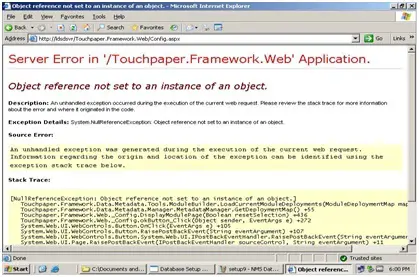Problem with ASP.Net Null Values

Hi! I am intermediate in ASP. Net and in some cases of using the NULL values, I am getting an error stating that “Object reference not set to an instance of an object”. I don’t get why then null value is used and then I got that accidentally. The next thing i know is, it is moved into database without tables with an error message appeared. Please see the picture below for your reference.

"Object reference not set to an instance of an object- Microsoft Internet Explorer
Server Error in '/Touchpaper.Framework.Web' Application.
Object reference not set to an instance of an object "
Any solution is greatly helpful.
Thank you.












